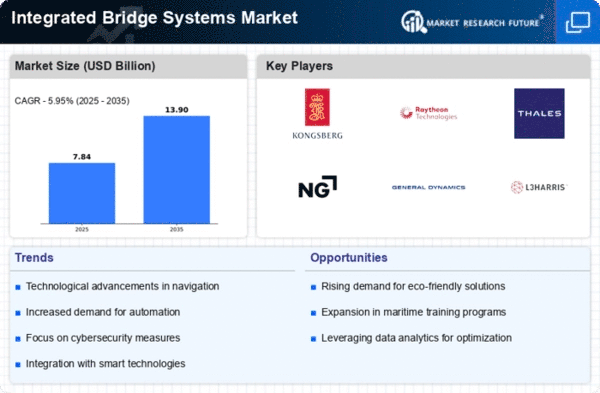Top Industry Leaders in the Integrated Bridge Systems Market

Strategies Adopted: To maintain their competitive edge, key players in the IBS market employ various strategies such as:
Innovation and Product Development: Companies invest heavily in research and development to enhance their product offerings with advanced features such as integrated navigation sensors, enhanced user interfaces, and connectivity solutions.
Strategic Partnerships and Collaborations: Collaborations with shipbuilders, maritime organizations, and technology partners help companies expand their market presence and access new opportunities.
Geographic Expansion: Key players focus on expanding their geographical footprint by establishing subsidiaries, distribution channels, and service centers in emerging markets.
Focus on After-Sales Service: Providing comprehensive after-sales support, maintenance services, and training programs helps companies build long-term relationships with customers and enhance customer satisfaction.
Key Players:
Alphatron Marine B.V. in Netherland
Furuno electric co. LTD in japan
Hensoldt in the U.K.
Kongsberg in Norway
Mackay communication, INC in the US
Marine technology LLC in Norway
Noris group in Germany
The Raytheon company in the U.S.
L3 Mapps INC. in Canada
Japan radio co, LTD in japan
Recent market development
Navantia launches final Avante 2200 corvette for Royal Saudi navy.
Factors for Market Share Analysis: Several factors contribute to the analysis of market share in the IBS market, including:
Product Portfolio: The breadth and depth of product offerings play a crucial role in determining market share, with companies offering a comprehensive suite of integrated bridge systems gaining a competitive advantage.
Technology Leadership: Companies that invest in cutting-edge technologies and innovations often capture a larger market share by meeting the evolving needs of customers and staying ahead of competitors.
Market Presence: The geographical presence and distribution network of companies influence their market share, with companies having a global reach and strong partnerships enjoying a competitive edge.
Customer Satisfaction: High levels of customer satisfaction, driven by product quality, reliability, and after-sales service, contribute to market share growth as satisfied customers are more likely to become repeat buyers and brand advocates.
New and Emerging Companies: In addition to established players, new and emerging companies are entering the IBS market, bringing fresh perspectives and innovative solutions. These companies often focus on niche segments or disruptive technologies, challenging traditional players and driving innovation in the industry. Some notable new and emerging companies in the IBS market include:
Wärtsilä Transas
RH Marine
SeaCross
Navico
Orolia Maritime
Industry News and Current Company Investment Trends: Recent developments and investment trends in the IBS market reflect a growing focus on digitalization, connectivity, and sustainability. Key highlights include:
Increased Adoption of Digital Solutions: Companies are investing in digitalization initiatives to enhance data integration, analytics, and decision-making capabilities, driving efficiency and operational excellence.
Emphasis on Cybersecurity: With the growing threat of cyberattacks, companies are ramping up cybersecurity measures to protect onboard systems and data, ensuring safe and secure navigation.
Integration of IoT and AI: Integration of Internet of Things (IoT) and Artificial Intelligence (AI) technologies enables predictive maintenance, real-time monitoring, and autonomous navigation, driving efficiency and safety.
Sustainability Initiatives: Companies are increasingly focusing on eco-friendly solutions, such as energy-efficient systems, emission reduction technologies, and sustainable materials, to minimize environmental impact and comply with regulations.
Overall Competitive Scenario: The Integrated Bridge Systems (IBS) market is highly competitive, driven by technological advancements, regulatory requirements, and evolving customer preferences. Established players leverage their experience, expertise, and global presence to maintain their market leadership, while new entrants disrupt the market with innovative solutions and agile strategies. As the industry continues to evolve, companies that embrace digitalization, sustainability, and customer-centricity will thrive in the competitive landscape of the IBS market.











